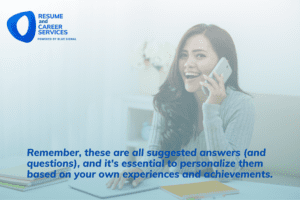Your Cheat Sheet to Pass the Initial Phone Interview Screening

After applying to several positions that you’ve felt sure you were qualified for and hearing nothing back, finally… success! You’ve landed an initial phone interview. Congratulations! While this is just the first step in the process to securing a job offer, it’s an important first step, and how you interact with the person on the other end of the line can determine if you move forward in the process.
Given that the average job posting receives 200–250 applications, you should be thrilled to have been invited to do a phone interview screening. Of those applicants, roughly 4–6 people move through to a phone screening. But that doesn’t mean you’re a shoo-in! The goal of the screening is to eliminate candidates, not to push them forward, so everything you do and say matters!
To get you ready for the phone interview screening, we’re sharing some of the most important questions you can look forward to being asked—as well as some suggestions for how to answer them.
1. Why are you looking to leave your current job?
When answering this question, it’s important to remain positive and focus on your career growth. This is not the time to talk about your toxic work environment, how you don’t get along with your boss, or how you’re never going to get a raise where you are. Instead, highlight the aspects of the new position that align with your professional goals, such as seeking new challenges, expanding your skill set, or finding a better cultural fit.
Example answer:
“I am looking for new opportunities that align with my long-term career goals. While I appreciate the experiences and growth I’ve gained in my current role, I believe it’s time to explore a new challenge where I can further develop my skills and contribute to a dynamic and innovative organization like this one. Your company’s reputation for fostering professional growth and the chance to work on diverse projects greatly interests me.”
2. What is it about this job that interests you?
 Employers want to know that you’re genuinely enthusiastic about the opportunity at hand. Research the company and the role to understand its unique aspects. Be sure you’ve thoroughly read the job description so you can mention specifics that the company is seeking in a new hire. Then tailor your response by emphasizing how your skills, experience, and values align with the company’s mission, values, and culture. Highlight specific projects or initiatives that excite you and explain how they align with your career aspirations.
Employers want to know that you’re genuinely enthusiastic about the opportunity at hand. Research the company and the role to understand its unique aspects. Be sure you’ve thoroughly read the job description so you can mention specifics that the company is seeking in a new hire. Then tailor your response by emphasizing how your skills, experience, and values align with the company’s mission, values, and culture. Highlight specific projects or initiatives that excite you and explain how they align with your career aspirations.
Example answer:
“I am genuinely excited about this job opportunity because it combines my passion for [specific field or industry] with my expertise in [relevant skills or experience]. The chance to [mention specific responsibilities or projects] and make a meaningful impact on [mention target audience or company goals] is highly appealing to me. Additionally, I appreciate the collaborative and inclusive culture that this company fosters, which aligns with my values and the type of environment where I thrive.”
3. How do you feel that your experience and talents align with what we’re looking for?
Use this question to showcase your qualifications and demonstrate how you can add value to the organization. Again, identify the key skills and requirements listed in the job description and highlight your relevant experiences and achievements that demonstrate your competency in those areas. Be specific and provide concrete examples to support your claims.
Example answer:
“Based on my research and the job description, I believe my experience and talents align well with what your company is seeking. In my previous role at [previous company], I successfully [mention relevant achievements or responsibilities that demonstrate the desired skills]. These experiences have equipped me with a strong foundation in [mention key skills or qualifications]. I am confident that my expertise in [mention specific areas] and my ability to [mention relevant abilities or strengths] will enable me to contribute effectively to the goals and objectives of your team.”
4. What is the salary range you’re targeting?
Salary discussions can be delicate, especially during the initial stages of the hiring process. Some companies won’t bring this up right away, while others will use this as a litmus test to see if it’s worthwhile to move forward with you as a candidate. When asked this question in a phone interview, it’s best to avoid discussing specific numbers. Instead, focus on your enthusiasm for the position and the opportunity to contribute to the company’s success. You can share that you are open to a competitive compensation package based on industry standards and your level of experience.
Example answer:
“While salary is an important factor, my primary focus is finding a role that aligns with my skills and offers opportunities for growth. I’m confident that this company has a competitive compensation package based on industry standards and my level of experience. I am open to discussing salary further as we progress in the interview process and gain a better understanding of the responsibilities and expectations associated with the role.”
While the above four questions are relatively standard in an initial phone interview screening, the interviewer may wish to dive deeper. If so, these are some questions you may be asked.
5. Tell me about a challenging situation you faced at work and how you resolved it.
This question aims to assess your problem-solving abilities, adaptability, and conflict-resolution skills. When answering, choose a relevant example that highlights your ability to handle challenges effectively. Outline the situation briefly, describe the steps you took to address it, and then focus on the positive outcome or lessons learned. These will closely resemble the accomplishments that are on your resume and will probably be about making money, saving money, making people happy, or improving processes.
Example answer:
“In my previous (or current) role, we faced a sudden increase in client demands, leading to a backlog of projects. Recognizing the urgency, I proactively organized a team meeting to assess the situation and prioritize tasks. We implemented a streamlined workflow and divided responsibilities based on each team member’s strengths. Through effective communication and collaboration, we not only met the deadlines but also exceeded client expectations. This experience taught me the value of teamwork and the importance of adapting quickly to changing circumstances.”
 6. How do you handle tight deadlines and high-pressure situations?
6. How do you handle tight deadlines and high-pressure situations?
Many companies are fast paced, and they need employees who can think on their feet. Therefore, this question in the phone interview assesses your ability to work under pressure, manage time effectively, and maintain composure. Provide a specific example that demonstrates your ability to handle tight deadlines and stressful situations while maintaining quality and professionalism. Highlight your organizational skills, prioritization techniques, and your capacity to stay calm and focused in demanding environments.
Example answer:
“In my previous role, I often encountered tight deadlines and high-pressure situations, particularly during peak seasons. To manage such situations, I developed a time management system that involved breaking down tasks into smaller, manageable chunks and setting realistic milestones. I would communicate with my team and stakeholders to ensure everyone was aware of the timeline and any potential challenges. Additionally, I would leverage my problem-solving skills to find innovative solutions and streamline processes to meet the deadlines without compromising the quality of work. By effectively managing my time and staying composed, I was able to consistently deliver results, even in high-pressure situations.”
5. Do you have any questions for me?
Toward the end of the phone interview, you can expect that you’ll be asked if you have any questions to ask. Always have a few well-thought-out questions prepared for the interviewer. This demonstrates your interest in the role and company, as well as your proactive approach to gathering information. Ask about the company’s culture, team dynamics, opportunities for professional development, or any specific projects you found intriguing during your research. Avoid questions about salary, benefits, or vacation time during this initial screening phase.
Example questions:
-
“Can you tell me more about the company culture and how it supports professional development?”
-
“What will success look like in this role within the first six months?”
-
“Are there any specific projects or initiatives that I would have the opportunity to contribute to?”
Remember, these are all suggested answers (and questions), and it’s essential to personalize them based on your own experiences and achievements. The key is to provide specific examples that demonstrate your skills, highlight your accomplishments, and align with the job requirements.
Resume and Career Services Provides the Support You Need for Your Phone Interview—and Beyond
At Resume and Career Services, we’re about so much more than getting your resume and career documents in tip-top shape. Everyone who works with us has access to our comprehensive database of educational lessons, including videos, that cover everything from determining the right career track to negotiating your salary. And when you choose our Career Advocate Program, you also get partnered with your own coach for weekly sessions that are sure to accelerate your results.

 6. How do you handle tight deadlines and high-pressure situations?
6. How do you handle tight deadlines and high-pressure situations?